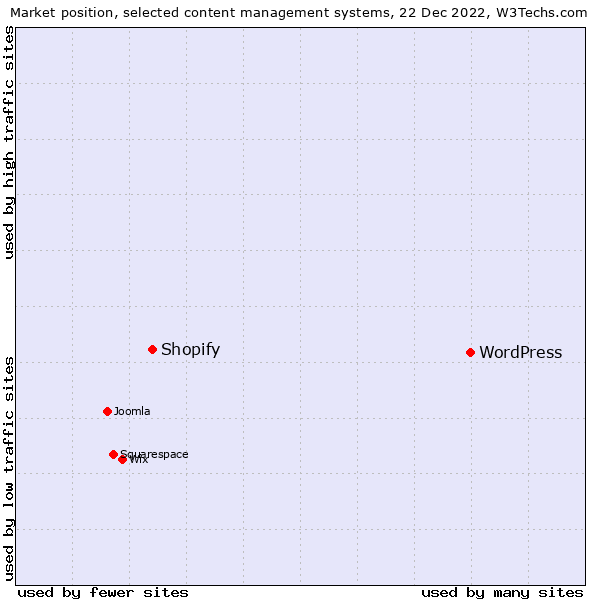WordPress is a popular choice among eCommerce businesses. It's a free, open-source platform where anyone can blog, create websites, and customize them to their needs.
Shopify is a paid solution that comes with all of the bells and whistles you need to start selling online. You can build your own store from scratch or select from one of Shopify's ready-made themes or extensions, like WooCommerce (an eCommerce solution for WordPress users) or Magento (a large eCommerce platform).
We've put together this brief comparison to help you decide which option is right for your business.
WordPress vs Shopify: What's the Difference?
Both WordPress and Shopify are open-source content management systems (CMS). They both allow you to create websites that look great, but there are some differences between them.
WordPress has been around since 2003 and is one of the most popular CMSs on the market today. It's also free to use with no monthly fees or contracts required. However, there are some limitations in terms of features such as customizing or adding new plugins or extensions.
The biggest difference between WordPress and Shopify is that WordPress is a bit more flexible when it comes to customization options, while Shopify has more advanced features such as WooCommerce e-commerce platform integration.
Feature Comparison Table Between Shopify And WordPress
|
Key Features |
WordPress |
Shopify |
| Hosting included | NO | YES |
| Designed for eCommerce | NO | YES |
| Visual editor | YES | YES |
| Free SSL certificate | NO | YES |
| Subdomain included | NO | YES |
| Email included | NO | YES |
| 24/7 support | YES | YES |
| GDPR compliant | NO | YES |
| Free trial | NO | YES |
| First-party POS system | NO | YES |
| Automatic site maintenance | NO | YES |
| Buyer facing app | NO | YES |
| Easy customization | YES | YES |
| Easy to use | YES | YES |
| PCI-DSS compliant | NO | YES |
| Built-in CMS | YES | YES |
| Built-in fraud protection | NO | YES |
| Unlimited storage | NO | YES |
| Out-of-the-box solution | NO | YES |
How Many People Use WordPress And Shopify?
Shopify and WordPress are used by millions of people. Freelance WordPress developers work with thousands of clients, who ask them to create thriving e-commerce stores.
Here's what we've seen:
Shopify has grown from a small company to one of the largest platforms for selling physical products online.
WordPress powers over 50% of the websites on the internet, making it one of the most popular content management systems in use today.
The number of people who use a WordPress or Shopify platform to sell their products online is constantly growing.
According to a report from Statista, the number of people who Hire WordPress Developers to use WordPress and Shopify has increased by 78% in 2018 alone. This is compared to the growth of 20% seen between 2020 and 2022.
The reason for this growth is simple: more people are becoming aware of the benefits of selling on these platforms, both in terms of privacy and convenience.
This means that as more and more people start using these platforms, there will be an increase in demand for freelance Shopify developers and WordPress developers.
Market Share of WordPress & Shopify

WordPress is used by 65.3% of all the websites in the market.
WordPress is used by 43.3% of all websites and ranks in the top 1,000,000.
Market Position
This diagram shows the market position of the selected technologies in terms of popularity and traffic compared to the most popular content management systems.

How Easy Are WordPress and Shopify to Use?
Both Shopify and WordPress have a lot in common. Both are open-source, which means that you can use the same software as anyone else in the world. In addition, both platforms are easy to install and configure, you can Hire Shopify Developers for any assistance. Both platforms have built-in payment processors that make it easy to accept credit card payments.
Shopify's biggest advantage over WordPress is that it's much easier to build an online store with Shopify than with WordPress. You don't need any special programming skills and you don't need to learn how to code HTML or CSS. With Shopify, you just install the app on your website and go!
If you already know HTML or CSS, then you'll probably want to use WordPress instead of Shopify because it's easier for experienced freelance WordPress developers to set up. All you need is a basic understanding of how websites work and how they're built.
WordPress vs Shopify for SMEs
Over the past decade, Shopify has become one of the most popular eCommerce platforms for small businesses. It’s easy to use, affordable and scalable for new companies. Meanwhile, WordPress is one of the most popular content management systems on the web, making it an ideal platform for larger online stores.
Both are giants in the eCommerce space, but both cater to very different needs. It’s important to identify which platform matches the needs of your business, as the last thing you want is to start building an online store with software that doesn’t tick all the boxes.
WordPress is an award-winning content management system (CMS) that makes it easy to create and manage websites. It’s highly customizable, has great SEO capabilities, and comes with a free plugin directory.
Shopify is a platform that makes it easy to set up and run your online store. It provides tools such as a drag-and-drop interface, multiple payment gateways, and marketing tools that make it easy to sell products online.
WordPress allows you to build an eCommerce site using HTML, CSS, and JavaScript (the latter being particularly useful if you want to make some customizations). Shopify is more focused on helping businesses sell physical products online, but it also supports affiliate marketing programs and coupons.
Both platforms offer cloud storage solutions for your products and order history — which means that if you're running an online store from either platform there'll be no need for you to manage backup systems or data backups yourself. Both platforms also allow customers to access their orders from any device — which makes them ideal for mobile commerce applications.
To Summarise
WordPress is a great platform for small businesses of all types. It has fantastic features and a large community, but it can be expensive to start out. Shopify is an attractive alternative that's easy to set up, offers a free plan, and offers more flexibility than WordPress. If you're looking for something that's easy to use and integrates with your existing website, Shopify might be right for you.









